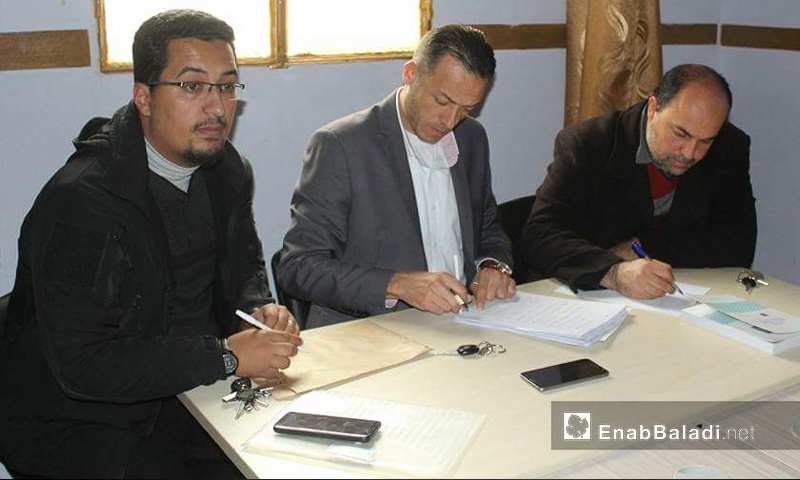In the thick of the forger’s faked documents in northern Aleppo, identity documents and the files of the civil registry were all lost without restrictions to curb the phenomenon, amidst the concerned civil communities attempts to activate the Civil Registry Department, which they consider as the solution to resist and limit randomness.
Akhtarin Town’s local council, in the city of Azaz, in northern Aleppo, is getting ready to open the Civil Register’s building, according to Mohammed al-Haj Qassem, the Director of the Legal Office in the Council.
In early June 2017, a study was field concerning the restoration of the old Civil Register building, destroyed in the battles against the “Islamic State (IS),” according to al-Haj Qassem. He indicated that the restoration process started with the support of the Turkish government, in September 2017, which witnessed a competition to recruit staff for the registry department under certain conditions.
For the time being, the people who succeeded in the competition will be enrolled in training courses to start working in the Civil Registry, early next February, pending the arrival of records from Turkey, according to the Council of Akhtarin.
The “Free Army” factions controlled most of the northern and eastern areas of Aleppo, within the context of Turkey supported “Euphrates Shield” operation, which started in August 2016.
Registration of Emergency Events
Upon activating the Civil Registry, the citizens would be provided with the chance to register urgent events, such as marriage, divorce, death, birth and the like, in addition to the ability to obtain personal documents, family registers and other services.
The attempt to reopen the “Civil Registry” came in the context “that seeks to bridge the gap caused by the absence of the departments and establishments which issue documents for citizens.” According to al-Haj Qassim, “it is necessary to offer [citizens] services that relate to providing them with needed documents and follow up of the legal, administrative and judiciary transactions.”
The Civil Registry staff will conduct a population census, ensure that the data are correct and register them in the records according to “the followed procedures.”
“Social Damage” in the Absence of Official Entities
According to Abdul Salam Al Qassim, from the town of Dabiq, people were forced to fake family documents and records, as well as identity cards in the shadow of the closed Civil Registry. He said that today, people can obtain personal documents with all the information they need; this is socially harmful.
The young man believes that opening the Registry facilitates the work and reduces dependence on illegal documents, noting that marriages and other transactions during the revolution, “were not fully registered and were limited to customary marriage through the Sheikh, without anything to prove the rights or the dowry.”
Abdul Salam pointed out that “birth registration is more important, for, in the past seven years, people have married and had hundreds of children and no official government acknowledges these marriages. There are not any civil records or family registers that prove the identity of the father and the mother of the child who would want to go to school.”
Ausama Mohammed, from Azaz in the northern countryside of Aleppo, spoke of the Civil Registry in Akhtarin when “IS” entered the area and said that the latter closed the building. “Since then, we were not able to register anything or to obtain a personal Status record, which I needed more than once.”
The absence of the Civil Registry harmed the people in rural Aleppo, according to Ausama, who said that “the Turkish side does not allow sick people to enter unless they have identity documents forcing some of them to forge official papers.”
Ausama believes that forgery is harmful to society in general, for some people managed to obtain two identity documents with two different names while many others, to the day, do not have any documents to prove their identity. A solution must be found to overcome the problem which might inflate and affect the situation in the region negatively.











